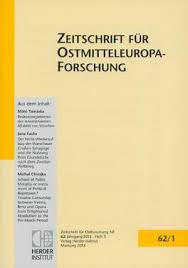Im erinnerungspolitischen Sog. Debatten um die Erinnerung an Flucht, Vertreibung und die Ostgebiete im geteilten Deutschland
In the undertow of the politics of memory. Controversies in divided Germany about the memory of flight, expulsion and the Eastern territories
Author(s): Christian LotzSubject(s): Political history, Post-War period (1950 - 1989), Politics of History/Memory, Peace and Conflict Studies
Published by: Verlag Herder-Institut
Keywords: politics of memory; controversies; divided Germany; memory of flight; expulsion; Eastern territories;
Summary/Abstract: Memories of the forced migration of Germans at the end of Second World War and the history of former German territories in Eastern Central Europe have been the subject of lively discussion both among academics and the general public. This study examines the political controversies surrounding the memories of flight and expulsion in the divided Germany of the 1950s and 1960s. How did the balance of forces within the ‘politics of memory’ shift? Which side, at what time, could claim to be winning the battle of opinion? In its analysis, the study takes as its two principal examples the Landsmannschaft Schlesien (Organisation of Expellees from Silesia, LS) and the Helmut-von-Gerlach-Gesellschaft (Helmut von Gerlach Society, HvGG, a society promoting German-Polish rapprochement). In its interpretation of history, the LS emphasised a purely German character of the Eastern territories and the coercive nature of the migration. By contrast, the HvGG’s interpretation stressed the social conflicts (class struggle) in the Eastern territories between a minority: German capitalists, and the majority: Polish workers, and talked of an orderly resettlement of the Germans. From the manifold and complex past, both LS and HvGG deliberately chose suitable examples which could be used as arguments in the dispute over the Oder-Neisse border. There arose an undertow in the politics of memory: those arguments which pointed to the German character of the Eastern territories and to forcible expulsion were used by the LS as arguments against the Oder-Neisse border. By contrast, all those aspects which indicated social conflict in the Eastern territories, were used by the HvGG as an argument for the Oder-Neisse border. In the initial period following 1945 the LS and the other expellee organisations could claim to be winning the battle of historical interpretation. From 1956/57 onwards the expellee organisations were gradually obliged to retreat, as a relaxation in international tension together with the light shone by judicial and academic investigations on Nazi Crimes cast doubt on the expellee organisations’ view of history and their demands for a revision of the border. The HvGG in its influence was, however, unable to gain all the ground from which the LS had retreated. Its interpretation of history was simply to remote from the personal experiences of many refugees and expellees. In addition, more and more Germans, both in East and West (particularly in the rising generation), increasingly displayed indifference to the memory of German history in Eastern Europe.
Journal: Zeitschrift für Ostmitteleuropa-Forschung
- Issue Year: 59/2010
- Issue No: 3
- Page Range: 323-343
- Page Count: 21
- Language: German

